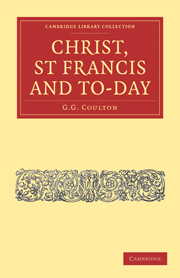Summary
DURING my last two years of study among the early Franciscan records with history pupils, we have been frequently confronted with problems too exclusively religious to come within the scope of the Historical Tripos. Therefore I have been tempted more and more to seek a wider audience before whom these questions might be discussed, free from the necessary restrictions of the Tripos, and in equal freedom from the conventions of the pulpit. Now, or never, is the time to test our ultimate beliefs. On what do they rest? How far are we prepared to modify them, if necessary? And how far is such modification necessary, if we are not to be left clinging to unrealities in a real world; if we are not to sacrifice what is and what shall be to the shadow of that which might possibly have been instead, if God had willed the education of the human race to be other than it actually is and has been?
It seems increasingly probable that one of the most fatal intellectual limitations of the middle ages was due to the divorce of religious and philosophical and political discussion from ordinary private life—a divorce not complete, of course, but still very serious. In those days, men lived in one language—if I may so put it—and philosophized in another; they lived in the mother tongue, and tried to think their higher thoughts in Latin.
- Type
- Chapter
- Information
- Christ, St Francis and To-day , pp. 1 - 22Publisher: Cambridge University PressPrint publication year: 2010First published in: 1919

